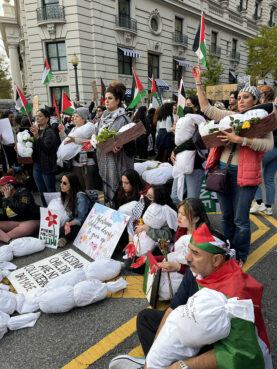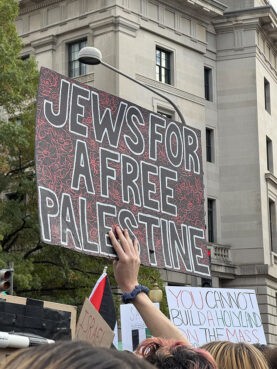
WASHINGTON (RNS) — The streets of Washington, D.C., on Saturday, Nov. 4, played host to what organizers claim is the largest pro-Palestine rally ever held on American soil. Protesters filled Pennsylvania Ave and convened at Freedom Plaza, just a few blocks from the White House, to demand a ceasefire in the ongoing Israel-Hamas war, a “lifting of the siege on Gaza,” and an end to U.S. aid to Israel.
Organized by a coalition of nine nonprofits and advocacy groups, among them the American Muslim Alliance, and endorsed by about 250 others, the event featured a number of Muslim and Jewish groups, both on the platform and in the crowd. Nihad Awad, executive director of the Council on American-Islamic Relations, took to the stage in a speech denouncing Islamophobia and any retaliation aimed at pro-Palestinian protesters.
“The children of Gaza, the people of Gaza, rely on your voices, on your activism, and do not be scared, do not be intimidated,” he said. Both Islamophobic and antisemitic incidents have risen in the weeks since the war started, including the fatal stabbing of a six-year-old Palestinian American boy in Illinois.
The D.C. gathering, dubbed the Free Palestine March, was one of dozens taking place around the world Saturday — including marches in San Francisco, London, Berlin and elsewhere — to demand a cease-fire in Gaza, where violence has continued to escalate over the weekend. The health ministry in the Hamas-run enclave is reporting as many as 10,000 Palestinians, the majority civilians, have been killed in Israel’s ongoing retaliatory siege after the Hamas attacks on Oct. 7 that left 1,400 Israelis dead and more than 200 taken hostage.
In an Instagram post, the ANSWER coalition, an umbrella group that includes a number of anti-war and civil rights groups who organized the event, claimed around 300,000 protesters attended the D.C. march, though that number has not been independently verified. Protesters traveled from all over the country to participate, with traffic backing up as far away as New Jersey and Delaware, while people with signs like “honk for a free Palestine” taped to their bumpers filled the highways headed to D.C.
Demonstrators hold effigies of killed Palestinian children during a pro-Palestinian rally in Washington, Saturday, Nov. 4, 2023. (RNS photo/Whitney Bauck)
The scene on the ground was colorful and loud, as protesters of all ages packed shoulder-to-shoulder across the road, with others crowding the second-floor windows of a nearby CVS for a better view. Many in the crowd wore black-and-white keffiyeh, a signal of solidarity with Palestine. Watermelons, an emergent symbol for Palestine due to their shared colors with the flag, dotted signs, alongside calls for a free Palestine. As speakers began to address the crowd from a distant stage, one young man scaled a stoplight to wave a giant Palestinian flag above the crowd, while another held up a cardboard sign reading “Parrots for Peace” as a live blue-and-gold macaw fidgeted on his shoulder.
Though there were posters artistically decorated with flowers, birds, peace signs and watermelons, as well as appeals to love from the mainstage, the mood was often grave. One group carried a white banner nearly a city block long printed with the names of Palestinians known to have been killed in Gaza in the last month. Another group, mostly women, some with tears streaking their cheeks, carried white-wrapped bundles meant to evoke children in body bags, with the names and ages of children killed in the bombings written on the outside. Some of the women held signs, reading, “Palestinian children are not collateral damage.”
Much of the critique of the day was aimed at American politicians. One protester carried a sign claiming the “U.S. Government says we can afford war, weapons and state-sanctioned violence,” but “we can’t afford healthcare for all, shifting to green energy, student loan forgiveness or affordable housing.” Another read, “14.3B dollars to kill more babies,” a reference to the military aid package for Israel approved by the House on Thursday and the nearly half of the Palestinian population who are under 18 years old.
Awad, in his speech, called out the administration and encouraged participants to make their anger over the issue known in the voting booth.
“The language that President Biden and his party understand is the language of votes … and our message is: No ceasefire, no votes,” he said. Recent polling indicates Arab and Muslim American voters are souring on Biden in the wake of the administration’s response to the conflict.
Religious Jews and Muslims were visibly present in the crowd as well as on the main stage. Just one street over from the official gathering, a group of Muslims laid mats on the ground to pray together, facing Mecca. Back in the crowd, a teenage girl wearing a hijab carried a sign, reading: “You don’t need to be Muslim to stand for Palestine, you just need to be human.” One person wearing a yarmulke carried a sign adorned with the star of David and a Palestinian flag that read: “No genocide in our name, never again for anyone!!!” Other signs read: “Jews for a free Palestine” and “Anti-Zionism is not anti-Semitism.”

Signage during a pro-Palestinian demonstration in Washington, Saturday, Nov. 4, 2023. (RNS photo/Whitney Bauck)
The distinction between Jews in general and Zionists in particular was also highlighted by Neturei Karta, a group that self-describes as “Anti-Zionist Orthodox Jews.” Through a prepared statement read by a proxy (“due to religious restrictions of the Jewish sabbath, we apologize that we cannot speak to you using the microphone,” the statement began), the group asked the crowd: “Please never refer to the State of Israel as a Jewish state. … Please refer to it as a Zionist state and to people supporting it as Zionists, not as Jews.” The group condemned “the horrific genocide of innocent men, women and children occurring now in Gaza and the ongoing brutal occupation of Palestine for over 75 years” and stated that previously “Muslims and Jews have lived for hundreds of years in Palestine with a beautiful coexistence. The difference of religion was not a reason for conflict.”
Amidst the groups protesting in the name of Judaism and Islam, there were few that were visibly Christian. Signs explicitly appealing to Christianity were rare, and of the mostly secular 250+ endorsements for the march, only a few came from Christian groups, such as the Dorothy Day Catholic Worker House of DC and the Sisters of St. Dominic of Blauvelt (though Christians have been involved in other protests calling for a ceasefire).
Ultimately, the organizers said from the stage, the protesters should know “they are the future.”
“This is the largest pro-Palestine demonstration in U.S. history,” one speaker said. “This will never be forgotten. This is not the culmination — this is the beginning.”

